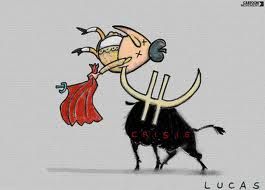 The economic crisis in Spain was supposed to have been resolved in an agreement reached June 29 EU Summit but clearly Germany missed the point of this part:
The economic crisis in Spain was supposed to have been resolved in an agreement reached June 29 EU Summit but clearly Germany missed the point of this part:
“We affirm that it is imperative to break the vicious circle between banks and sovereigns”
Instead of bailing out the banks without adding the burden of repayment on the Spanish government, Germany reversed that and place the burden for repayment entirely on the Spanish tax payers increasing the cost for Spain to borrow and causing the markets around the world to drop:
Analysts pointed to a combination of factors, including a decision by the Valencia regional government to seek a bailout from Spain’s central government as well as revised economic forecasts by Spain’s government. [..]
Strategists said market participants also registered disappointment with provisions of a bailout plan for Spanish banks approved by euro-zone ministers Friday. For now, liability for the package, which is expected to total as much as 100 billion euros ($123 billion), remains with the Spanish government.
That “will do nothing to break the ‘vicious circle between banks and sovereigns’ that EU policy makers asserted was ‘imperative to break’ in the statement that followed their June 29” summit meeting, wrote strategists at Capital Economics.
Spain’s approval of an austerity program didn’t help either:
AS David Dayen point explains Britain’s austerity measures haven’t eased their debt/deficit problem, instead has increased it:
Another austerity program in Spain, in a time of 24% unemployment, has no chance of succeeding, either in improving the economy or even reducing the debt. We have a test case of that today, in Britain:
Chancellor George Osborne’s deficit-busting plans are struggling to keep up with full-year targets as official figures published today revealed another rise in Government borrowing.
Public sector net borrowing, excluding financial interventions, such as bank bailouts, was £14.4 billion in June, up from a revised £13.9 billion the previous year, the Office for National Statistics (ONS) said.
So Britain, which is two years into its austerity program, is borrowing more money than ever. It’s not reducing the deficit, it’s exacerbating it. And that’s what you should expect in Spain.
The International Monetary Fund (IMF) has called on the European Central Bank (ECB) to “to cut interest rates, implement a “sizeable” package of quantitative easing, and wade into bond markets to drive down borrowing costs.”
The IMF expressed concern about “reinforced negative bank-sovereign linkages” – the increasingly close connection between struggling banks, many sitting on billions of euros of government bonds; and their home states, which in many cases have been forced to offer them aid.
This vicious circle “could further weigh on confidence, growth, and public debt trajectories”, the IMF suggested.
As Spain’s borrowing costs rose, Germany was able to borrow money at a negative real yield – suggesting investors are effectively willing to pay Berlin for holding on to their cash.
In its strongly worded report, the IMF warned that ultra-low bond yields in Germany and other “core” eurozone economies were a sign of malfunctioning financial markets that are depriving other countries of funds.
“Investors are withholding funding from member states most in need, moving capital ‘north’ and abroad to perceived safer assets. This has contributed to divergences in liquidity conditions and lending rates within the euro area, adding to already-severe pressures on many bank and sovereign balance sheets and raising questions about the viability of the monetary union itself,” it said.
The only country that has benefited from this crisis is Germany and all the talk at the EU Summit to stabilize the euro and end the crisis was useless because German Chancellor Angela Merkel never meant a word she said.


Recent Comments